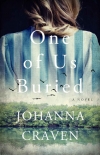One of Us Buried, Johanna Craven [superbooks4u TXT] 📗

- Author: Johanna Craven
Book online «One of Us Buried, Johanna Craven [superbooks4u TXT] 📗». Author Johanna Craven
“Be careful,” he said huskily. He bent his head and kissed the salty skin on the side of my neck.
Before I could reply, he was gone.
PART THREE
The courtroom is hot and cramped. I stand pressed between the other prisoners, their shoulders hard against mine. I can sense their racing hearts, can smell the sweat on their skin, feel as though I’m drowning in their fear.
Our trials are cursory, and we are given little chance to speak. The magistrate metes out punishments like a dull schoolroom recitation.
Assault of an overseer: to the coal mines in Newcastle.
Theft of government stores: remainder of sentence at Toongabbie.
And then I am brought forward; my name spoken, my charges read out.
I am given the chance to speak, but I know nothing I say will save me. I am a factory lass who has robbed a man of his life. I have taken that final step: murderess. I am to be made an example of; a cautionary tale of a woman who took the wrong path. A warning to the other factory lasses to be quiet, be moral, be obedient. I grip the railing of the dock, praying my legs will hold me when the inevitable verdict comes.
The magistrate’s words are no surprise.
For the murder of Adam Blackwell, you are sentenced to hang by the neck until you are dead.
CHAPTER TWENTY-ONE
With my ticket of leave in my pocket, I climbed back onto the barge. The morning was hot and hazy, eels wrestling beneath the surface of the river. I watched over my shoulder as Parramatta and the charred shell of its factory vanished behind a wall of forest.
I felt focused as we wound along the river, my eyes fixed on the road of coppery water. I had no plans beyond finding Lottie, no thought of what shape my life would take now. But my days as a Parramatta lag were behind me. I had more freedom than I had ever imagined I would have again.
The sun was sinking when the barge bumped against its moorings in Sydney Cove. In my twenty months away in Parramatta, Sydney Town had grown. I saw hints of London in its neatly carved stone and the church spires that interrupted the vastness of the sky. Rows of jetties had sprung up out of the mudflats and the sprawl of huts and cottages had begun to take over the forest. And the people; more people than I’d seen since England. Sailors and soldiers, ladies and lags, filling the streets with chatter, with colour; overwhelming in their sheer number.
How was I to find Lottie among the expanse of this place?
Hastily built taverns teetered on the waterfront, men clustered outside them, roaring with laughter. I dared a glance through the window of one, and saw hordes of sailors at bare wooden tables, some stumbling drunkenly into one other. I kept walking. On the corner of the road weaving inland from the harbour, I found a smaller tavern without the men gathered out the front. A wooden sign squeaked above the door, announcing my arrival at the Whaler’s Arms.
I stepped inside. The bar was small, with dark wooden panelling, barrels and bottles lined up neatly behind the counter. Round tables were dotted about the room.
“Close the door behind you, lass,” called the man behind the bar. “Flies’ll take over the place if you let them.”
The door groaned loudly as I yanked it shut.
“I’m looking for a man named Patrick Owen,” I told the barman. “Do you know him?”
The man was big and bearlike, with a dark beard that reached halfway down his chest. “Never heard of him.”
“Irishman,” I said. “Fair hair, handsome.”
The barman chuckled. “Taken your fancy has he? Sorry lass, afraid I can’t help you.”
As I made my way towards the door, I heard a tangle of Gaelic. I stopped walking. The voices came from a group of older men, crowded around a table in the corner of the bar. I had little doubt that Owen had caused as much of a stir among the Irish in Sydney as he had in Parramatta. I made my way towards the table.
“Patrick Owen,” I said. “Do you know him?”
One of the men blew a long line of smoke in my direction. “Who’s asking?”
I hesitated. “I’m a friend of his wife.”
And a gnarled brown finger was pointing in the direction of the street. “Owns a place out past the cemetery. Not too far from here.”
By the time I stepped out of the inn, the last of the sunlight was draining away. The sea slapped rhythmically against the docks, interspersed with horse hooves and the crunch of cartwheels against stone.
I followed the directions the man had given. Owen’s property was small and simple; a stone cottage at the front of few square paddocks. A lamp flickered at the front of the house, but it scooped out little of the darkness.
I made my way up the narrow path and knocked on the door, heart pounding. Was I scared of Owen, or scared of how Lottie might react when she saw me? Perhaps a little of both. Most of all, I was scared I would be too late.
A young woman in a mobcap opened the door. She looked me up and down. “Yes?”
I faltered. I hadn’t expected Owen to have a housekeeper.
“I’m looking for Lottie.” I swallowed. “For Mrs Owen.”
The girl knotted her apron around her finger. “Mrs Owen ain’t here no more.”
My stomach clenched. “What happened to her?”
“I heard she went to the Rocks.”
I frowned, not understanding. Still no wiser as to whether Lottie was alive or





Comments (0)